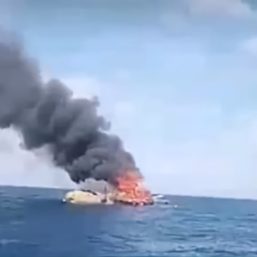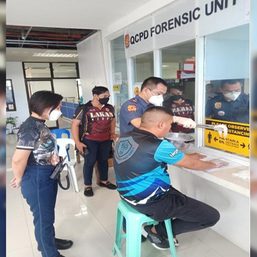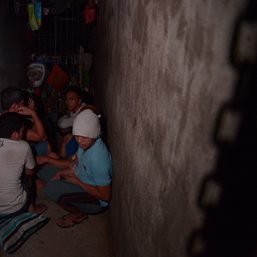SUMMARY
This is AI generated summarization, which may have errors. For context, always refer to the full article.
![[OPINION] Does the PNP view ordinary Filipinos as the enemy?](https://www.rappler.com/tachyon/2020/08/PNP-and-civilians-August-1-2020.jpg)
At around 11 in the morning of July 27, two officers from the Manila Police District (MPD) entered the nave of the Quiapo Church, walked towards a small group of activists sitting on the back pew, and without any warning, seized a blue-and-white paper bag containing several placards from party-list group Akbayan. The officers did not immediately offer any explanation for their action, but as Rappler’s Camille Elemia wrote later in her article, the posters “were not being used” when the incident occurred.
This provoked angry comments from netizens, such as celebrity mom Pia Magalona who described the two police officers as “mga kampon ni Satanas.” Unfortunately, the incident last Monday was not the first time that members of the Philippine National Police (PNP) displayed such utter disregard for the rights of ordinary citizens.
Civilians as ‘kalaban’
Early this year, during the Traslacion of the Black Nazarene, the cellphone of GMA News reporter Jun Veneracion was snatched by the head of the PNP’s Southern Police District (SPD), Brigadier General Nolasco Bathan, as he was recording a tense encounter involving a devotee and several policemen along Ayala Bridge. Bathan returned Veneracion’s phone a few minutes later, saying: “I’m sorry, Jun. I didn’t recognize you.”
The veteran journalist then checked his phone, only to discover that his video of the scuffle could no longer be found. Bathan, however, played possum, claiming, “Wala akong binura diyan, saksi ko pa ang Itim na Nazareno.” Fortunately for Veneracion, he was able to eventually retrieve his earlier recording from his phone’s Recently Deleted folder.
Less than 4 months later, on April 21, Police Master Sergeant Daniel Florendo Jr shot and killed former Army Corporal Winston Ragos after an altercation in a quarantine checkpoint in Barangay Pasong Putik, Quezon City. Discharged from the military in January 2017 for poor mental health, Ragos sustained two gunshot wounds on the body, and was later pronounced dead on arrival at the Commonwealth Hospital and Medical Center.
The PNP later claimed that a .38-calibre revolver was recovered inside Ragos’ sling bag. But 7 weeks later, on June 4, the National Bureau of Investigation (NBI) concluded that the police had planted evidence on the crime scene and that murder charges have been filed against Florendo and police trainees Joy Flaviano, Arnel Fontillas, Dante Fronda, and Dalejes Gaciles.
Then, on June 27, exactly a month before the incident involving Akbayan, another reporter of GMA News had a discomfiting encounter with members of the PNP. Mark Gene Makalalad was doing a live traffic report along Marcos Highway in Marikina when he was suddenly accosted by 4 police officers who inquired if he was a mediaman and then asked for his identification card. He was further told that he should have first asked for permission before proceeding with his live feed.
Makalalad responded that it was his first time to hear of such a directive, but asked if vloggers or ordinary citizens wanting to take videos should also ask for permission from the police. One of the officers then quickly replied, “Baka kasi, Sir, kalaban ka (You might be an enemy).”
“Doon nagpanting ang tenga ko (That’s when I got upset),” Makalalad later wrote in a Facebook post.
Though certainly said in haste, the last statement from the policeman reveals the probable mindset of the PNP: That every Filipino who is not wearing a uniform is a potential kalaban (enemy) and should therefore be identified, monitored and, if need be, neutralized.
But why is this so? How did we reach this point wherein the police see ordinary civilians not as people to be protected, but as threats to be subdued?
Deep are the roots
One possible answer can be found in the book Policing America’s Empire by American author Alfred McCoy, which traces the institutional history of the PNP. A product of more than a decade of research, the book argued that the roots of the PNP lie with the Metropolitan Police Force which was formed by the American colonial government in January 1901, with Captain George Curry as its first chief. Alongside the Metropolitan Police were more than 6,000 municipal police units which were appointed and supervised by Filipino town mayors loyal to the country’s colonial rulers based in Manila. That same year, the Taft administration created the Insular Constabulary, headed by a dashing cavalry officer from Kentucky, Captain Henry Allen.
Though organizationally distinct, the Constabulary and the Metropolitan Police shared the same objective of destroying the Malolos Republic and ensuring American dominance. These two organizations were therefore established as instruments of pacification and were oriented to view ordinary Filipino natives as possible insurrectos.
As McCoy explains:
“During its first 3 years in the Philippine Islands (1898-1901) the US Army of operations in the Philippines, successfully “combined combat operations, innovative policing, and civil reforms to crush the Filipino revolutionary army, creating an occupation government that it bequeathed to its civilian successor and thereby casting the new colonial state in its coercive mold.”
By the time of Martial Law, Ferdinand Marcos reformed the country’s police force and formed the Philippine Constabulary-Integrated National Police (PC-INP). The PNP later emerged in 1991 when the PC-INP were fused into a single organization through Republic Act No. 6975.
Path dependence
Though the PNP is supposedly civilian in orientation, its history as a tool of repression is still deeply ingrained in its organizational DNA. The PNP is therefore a good example of “path dependence” – a concept in political science which assumes that past decisions become institutionalized over time. This was underscored by noted political scientist Paul Pierson who stated that, “history matters,” because “once a particular path gets established…self-reinforcing processes make reversals very difficult.” And as a consequence, “political alternatives that were once quite plausible may become irretrievably lost.”
As for the PNP, it is its history as a colonial tool that defines its path as an institution. If we are to break this historical pattern, then difficult and deep-seated reforms would have to be undertaken at the soonest possible time, so that our police officers can truly embody their oath of serving and protecting the people. Such actions are even more important in this time of pandemic, so that the path-dependent behavior of our police force will not be an added bure on our already suffering nation.
If we fail to do so, then the PNP will simply persist in its mindset that the main threat to peace and order is the common Filipino. – Rappler.com
Francis Isaac is a freelance researcher with a master’s degree in International Studies from De La Salle University.
Add a comment
How does this make you feel?




There are no comments yet. Add your comment to start the conversation.